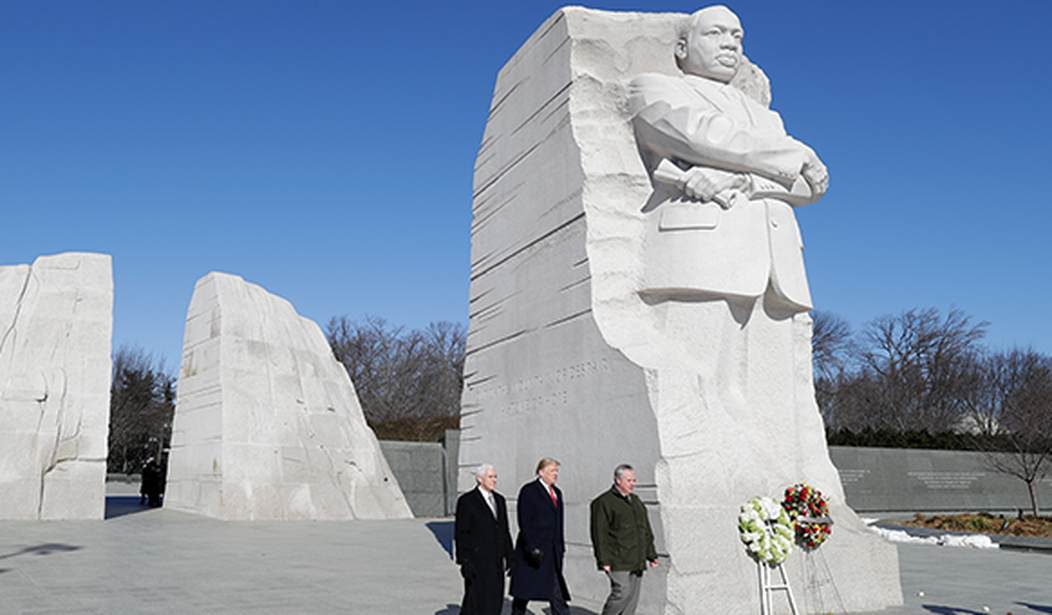President Trump’s recent directive stopping Critical Race Theory training in federal agencies is a clear affirmation of Dr. Martin Luther King Jr.’s vision of an America in which people are “not judged by the color of their skin but by the content of their character.” Calling Critical Race Theory training “a sickness that cannot be allowed to continue,” Trump took a bold stand for the vision of racial equality promoted by Dr. King and against the left-wing narrative about America that has crept into many of our cultural institutions.
Russ Vought, director of the Office of Management and Budget, informed federal agency heads of the president’s decision in a memo instructing them to cease using taxpayer dollars to fund training in “critical race theory,” “white privilege,” or other “anti-American propaganda” that provokes resentment and division among federal employees. The memo instructs agencies to identify and seek to cancel contracts for any training that teaches that America “is an inherently racist or evil country” or “that any race or ethnicity is inherently racist or evil.”
Critical Race Theory may sound like just another dry, academic theory whose reach is limited to a few bored college students. But when leftist politicians justify rioting and insurrection on the grounds that America is guilty of “systemic racism,” or when multi-millionaire athletes present themselves as victims in the very nation that made them rich, or when academics describe mathematics as white supremacist patriarchy, we can see the cultural effects of that theory.
Critical Race Theory derives from a shift in Marxist thinking widely known as “cultural Marxism.” Viewing social power dynamics and cultural norms of Western societies as sources of oppression and inequality, Marxist theorists shifted their strategy from seizing the means of production to a “long march through the cultural institutions” that that would challenge the moral and cultural foundations of the Western democracies.
Recommended
Critical Theory was initially developed by Marxist professors of the Frankfurt School as a means of relentlessly analyzing, criticizing, and weakening the Judeo-Christian cultural norms that stood in the way of achieving the communist vision. Instead of just pitting the proletariat against capitalists, the struggle expanded to include identity politics, pitting women against men, black against white, young against old, and other groups of perceived victims against their perceived oppressors.
Critical Race Theory is the extension of Critical Theory specifically to racial issues.
Essential to cultural Marxism and its derivatives is the idea that we should not view people as unique, morally responsible individuals, but as faceless members of various demographic groups with varying degrees of social and political power. In the struggle to destroy the current, inherently flawed system, content of individual character becomes secondary to color of skin, gender, economic status, and other indices of belonging either to privileged or to oppressed groups.
An implication of Critical Race Theory is that people are not guilty of racism because of what they do, but because of what they are. Even if whites are not racist in their actions, their guilt derives from merely being white and therefore having unfair privilege in a biased power structure. The theory is self-confirming, so it cannot be challenged. The very act of arguing against the charge of white privilege is seen as proof of white privilege, because people in privileged positions would be expected to deny having unfair privilege in order to maintain it.
The teachings of Critical Race Theory could not be more different from the vision of Dr. King and the early civil rights movement. In appealing to the moral and religious values of fellow Americans, Dr. King and the civil rights movement sought, not the destruction of America, but legal equality within it. They relied on moral persuasion, not coercion and intimidation. They understood that revenge for past injustices would only promote a cycle of new injustices and new revenge, so they sought healing and not retribution.
Dr. King’s dream appealed to both the minds and the hearts of mainstream Americans, and it transformed the nation. In the span of one lifetime, America went from segregation and unconscionable Jim Crow laws to having a black president and black Americans thriving in every profession and calling.
It is undeniable that racial disparities still exist in various social indices, and the left is quick to blame those problems on systemic racism. They have strong incentives to do so, because politicians on the left cannot afford too close a look at the results of their policies. As economists Walter Williams and Thomas Sowell, among others, have demonstrated, remaining racial disparities in academic achievement, income, and other social indices are more attributable to 60 years of leftist social policies that have devastated the black family and promoted what Sowell calls a “toxic message of victimhood” than to racial discrimination.
Typically, Republicans have been fearful of disputing the left’s narrative on race or confronting the left on the tragic results of their policies. But President Trump is not a typical Republican, and he has refused to surrender any group of Americans to the left’s message of victimhood. Content of character and not color of skin rang true in Dr. King’s vision as a moral standard for America. In rejecting Critical Race Theory, President Trump stands firmly with Dr. King’s vision.
Tim Daughtry is a conservative speaker and co-author of Waking the Sleeping Giant: How Mainstream Americans Can Beat Liberals at Their Own Game. Follow him on Twitter @TCDwriter and on Parler @TimothyDaughtry.

























Join the conversation as a VIP Member